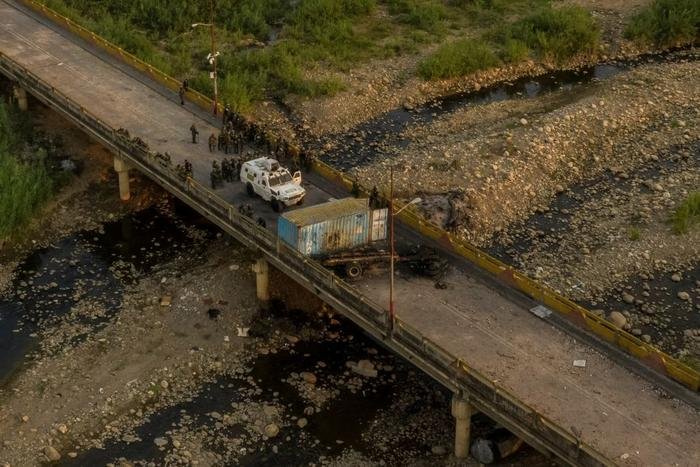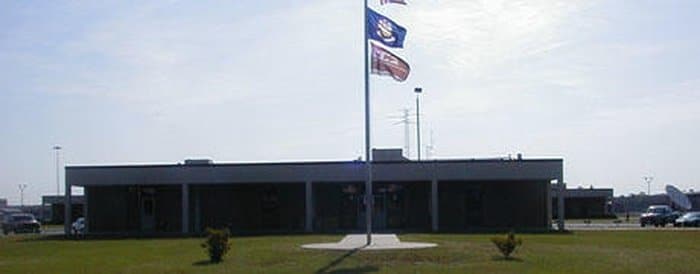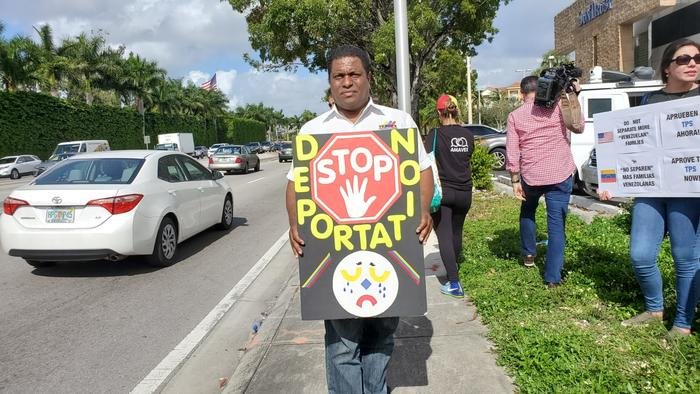“I Lost Everything. What I did was Worth Nothing”: Venezuelan Deserters who Supported Guaidó Now in ICE Custody


Orinoco Tribune – News and opinion pieces about Venezuela and beyond
From Venezuela and made by Venezuelan Chavistas

Editorial note: This is a Telemundo piece and we all know what interests they defend, but we consider the story (with some minor editing) relevant because there is journalism behind it and because -disregarding their intention to press US authorities for solutions for these mercenaries- they also make visible the silence first of anti-Chavismo leadership and second, of the US government.
Major Hugo Parra Martínez spends his days behind bars in constant tension: he does not know when he will leave or if immigration authorities will end up deporting him to Venezuela, where he says his life is in danger.
“I fell in a sack and I’m at the bottom. I lost everything: my family, my house. What I did was worth nothing. I don’t see a way out,” he says from the Winn Correctional Center in Louisiana, one of the prisons in which the administration of President Donald Trump holds thousands of immigrants while their asylum cases are resolved.
This major of the Bolivarian National Armed Forces (FANB), 42, no longer knows who to ask to intercede in his case.
“Here I’m only accompanied by the Bible and God, whom I implore every day to help me get out of here soon,” he says in a telephone conversation with Noticias Telemundo Investiga.
It has been more than eight months since he was handed over to US immigration authorities at the International Bridge number II of Nuevo Laredo, Mexico, on April 11. Since then, the Immigration and Customs Service (ICE) has moved him between detention centers twice, denied two requests for bail, and has not yet scheduled an appointment to see an immigration judge.
#AHORA “Reconozco a nuestro presidente, ingeniero @jguaido y estaré en lucha con el pueblo venezolano” afirmó a @heiderlogatto de la #VOA el Mayor del ejército venezolano Hugo Parra Martínez tras desertar, el anuncio fue hecho en el puente de #Tienditas en #Colombia pic.twitter.com/GuIE0kf2f7
— Voz de América (@VozdeAmerica) February 23, 2019
Parra is one of the more than 100 Venezuelan soldiers who rose up against the government of Nicolás Maduro when, in early 2019, the opposition deputy Juan Guaidó launched the so-called “Operation Freedom” and promised to get Venezuela out of the crisis, a transitional government and new elections.
Guaidó called on the military to get “on the right side of the story” and promised them “amnesty and guarantees.” But there was not enough in the armed forces and his attempt to remove Nicolás Maduro from Miraflores failed.
Los soldados con quienes he hablado han respondido a su deseo de vida y futuro para sus hijos que el Usurpador no les garantiza.
— Juan Guaidó (@jguaido) February 23, 2019
Soldado venezolano, el mensaje es claro: haz lo que te manda la Constitución. Habrá amnistía y garantías para quienes se pongan del lado del pueblo. pic.twitter.com/pvbbVbXWFt
Almost a year after the country was shaken by protests, the opposition is deeply fragmented and Venezuelans emigrate as a escape valve.
Although the United States was the first country to recognize and support Guaidó, catalog the Maduro government as a dictatorship and recognize the political and humanitarian crisis, it continues to detain and deport Venezuelans, for whom it has been reluctant to approve a Status of Temporary Protection (TPS) .
Meanwhile, dozens of soldiers who rose against Maduro have had to leave the country to live as refugees, mostly in Spain and Latin America.
Others like Major Parra came to the US to seek refuge in the same country that during the days of the insurrection showed its support. But after almost a year, this military feels abandoned by Guaido, who also said he would protect them.
Fleeing from Colombia
February 23, 2019 was the date of political inflection for Venezuela that would seal the fate of dozens of military personnel like Parra.

That Saturday Guaidó crossed the Tienditas International Bridge, in the Venezuelan state of Táchira, to the Colombian city of Cúcuta. There, dozens of volunteers hoped to pass 600 tons of “humanitarian aid” to Venezuela, stored in several containers.
In addition to the civilians, Guaidó needed the military to complete the operation. That day, -allegedly- some 1,200 troops decided to take a step that they did not know would push them shortly after into exile: swearing support to the leader of the National Assembly.
Parra was one of the first five to do so, and the highest ranking. The video of his encounter with Guaidó went around the world. The expectations were high.
“There was a lot of hope,” he recalls from the detention center in Louisiana. “But there was no necessary support from Guaidó and his people to annihilate the Maduro government. He had to have been more blunt, more radical.”
After a confrontation between the Chavista forces and those trying to force entry of the so called “humanitarian aid”, the operation failed. The military deserters like Parra delivered themselves to Colombia, where they were housed by the United Nations High Commissioner for Refugees (UNHCR).

Parra, who initially stayed in a parish house and then at the Acora de Cúcuta hotel, said he and his companions received death threats and were attacked with a car bomb. The insecurity caused many to leave the neighboring country as well.
In his case, he escaped with First Lieutenant Erick Molina to Mexico by plane. There both were handed over to the immigration authorities in Nuevo Laredo. The odyssey was just beginning.
Without lawyer or court date
After spending two months in detention at the Rio Grande Detention Center (Laredo, Texas) Parra was transferred to the Tallahatchie County Correctional Facility (Mississippi) in May. Two months later, in July, he was moved again, this time to Winn.
The Venezuelan “embassy” in Washington assigned him a pro-bono lawyer, but both agreed that they would not continue working together, after Parra complained about the lack of results and the defender responded that he was doing everything he could in the spare time he had from his other cases.
Now this soldier is being held without legal representation with few asylum benefits granted by immigration authorities.
“Of about 40 cases that I’ve had in recent months in this state, none have been granted asylum. And I don’t know anyone in a center in Louisiana who has been given it,” says immigration lawyer Lorena Pérez , who currently works for several clients pro-bono.
Perez says that the long times that the government forces immigrants to wait for answers to their cases inside detention centers are intended to wear them out, so they ask to be returned to their countries.
“It’s a race to see who can last longer, who is stronger,” she says.

Telemundo Investiga News found that Parra’s file number does not appear in the immigration court record, which may mean that after eight months since his detention, his case has not even begun to be processed in the system.
Erick Molina ran into a little more luck. After they were separated, he spent another three months in detention and was granted parole on bail. Now he waits in Austin, Texas, for an answer about his case of political asylum, but at liberty.
The ex-mayor Raynell Martinez, another military defector from the Venezuelan Air Force who entered the US in 2014 under similar conditions, has helped them both since they arrived in Mexico. Molina helped him get the bail money through donations. For Parra he has been able to do less.
“All the steps have been taken so that Guaidó’s ambassador to the US, Carlos Vecchio, will support Parra with a lawyer, but nothing has happened,” he laments.
“Viewed Askance” by the United States
There are those who believe that the cost of disregarding the cases of military dissidents will be high.

Leaving these soldiers in oblivion and with little or no protection could take away potential allies inside and outside Venezuelan territory and discourage other military from future uprisings, according to the former Bolivarian National Guard of Venezuela, José A. Colina , exiled in Miami and president of the Venezuelan Political Persecuted Group in Exile (Veppex).
“If this government recognizes that there is a violation of human rights in Venezuela, that there is a dictatorship that oppresses the people and that people are dying, then Venezuelans who arrive here should be given some protection,” says Colina.
The ex-military, interviewed in mid-December during a march of Venezuelan exiles in which they demanded freedom for some 400 nationals in ICE detention centers, questions that senators, congressmen and other US officials criticize the Maduro government, but do not take sufficient measures to protect those who flee from him because they fear for their life.”
Colina says he has repeatedly asked Guaidó and the State Department to intercede for a dozen soldiers in the same situation as Parra and Molina, but there has been no response.
The US government – says this former – takes more time with military cases because it takes time to determine that they are actually persecuted politicians who supported the opposition and not Chavista agents who seek immigration benefits or come as Maduro spies.
The case of Parra, whose support for Guaidó was recorded on video and had wide repercussions in the media, should not have taken so long, Colina claims. The military like him, who no longer have a place in Venezuela, are also “frowned upon” by the US government. “They are seen as part of the (Chavista) system,” he warns.
Guaidó is “aware”.
Telemundo Investiga News contacted the State Department to comment on military cases like Parra, but it declined to answer. Until the time of publication of this report, the Department of Homeland Security (DHS) had not responded to a request for information.
For his part, the director of Consular Affairs sent by Guaidó to Washington, Brian Fincheltub, said that Juan Guaidó is aware of the situation facing the dissident military like Parra and Molina, but that the deputy has more than this “incident” in his charge.
“Every day in Venezuela there are millions of emergencies and hundreds of cases like this that are happening,” he said. And he added that the resources of the diplomatic mission of the interim president in the country are limited and that their actions have restrictions “especially in immigration matters”.
“We have emphasized those cases (of the military) because we recognize that they had the courage to do what they did. However, it is not our decision that the US government makes the process faster or slower,” he added.
Fincheltub says the Embassy has made complaints to both ICE and DHS, but they have not received an answer: “We are doing everything in our power.”
Slave of a promise
The US has deported military to Venezuela after denying their requests for political asylum. One of the best known is the case of the former member of the Bolivarian National Armed Forces Helegner Tijera, who arrived in 2016 after defecting and spent two years detained by ICE before losing his case to an appeals court and being sent back.
Despite being out on bail, Erick Molina says he lives in “terror” of being returned to Venezuela. “We think that as the United States is an ally of Guaidó, they would talk to each other and help us with the immigration process,” he explains. “But all the military that left for Cucuta are nowhere. Floating.”

Molina says that they are more than 100 and that they are currently scattered around several parts of the region: “I am sure that (Guaidó) does not know who they are or where they are. They are scattered throughout Latin America: Argentina, Brazil, Peru, Chile. ”
Regarding the promise of protection and guarantees of the interim president, he says that “it was not fulfilled at any time.” “He has already become a slave to his promise,” he says.
In a recent interview with the Spanish newspaper El País in which he denies that “Operation Freedom” has been a failure, Guaidó said that it is necessary to seek greater support from the Armed Forces to achieve a transitional government.
Molina thinks that after seeing how things have developed, the opposition leader will find it even more difficult to obtain support from the sector with firepower in the future, something necessary to gain political control in Venezuela.
“Within the Armed Forces, more than one will not want to stand up against the regime, supporting a person who will not come through later,” he warns.
No regrets
Meanwhile, at the Winn Detention Center, Hugo Parra says he does not regret the step he took on February 23, when he shook hands with Juan Guaidó and said: “At your service, my commander in chief.”
He says that if he had Guaidó in front of him, he would recommend putting “a little more love and heart toward what he wants”, so that he can “achieve his goals”. However, he reiterates that he does not regret: “I would do it again,” he says.
Featured image: Hugo Parra Martínez, defending officer of the Bolivarian National Armed Forces (FANB)
Source URL: Globovision
Translated by JRE/EF